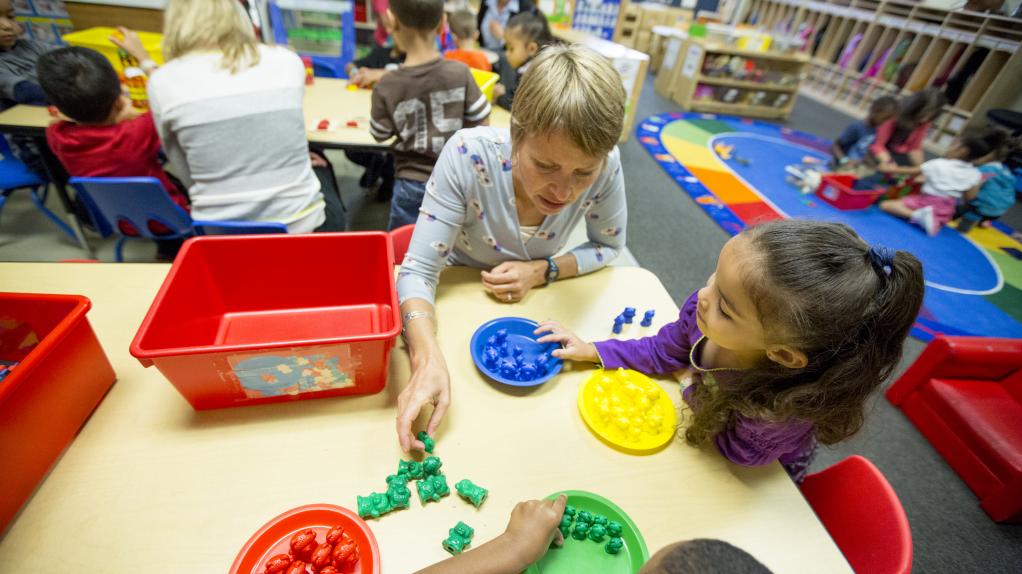Early Development and Education Initiative

School Readiness Intervention Program
Combining individual areas of expertise in language/literacy, math, and social-emotional development, the CoE-EDE faculty are engaged in this innovative and interdisciplinary initiative to promote young children’s overall school readiness.Welcome to the Early Development and Education (EDE) initiative at the College of Education of Lehigh University! We are an interdisciplinary group of faculty representing developmental, school, and counseling psychology, special and general education, comparative and international education, as well as educational leadership. We collaborate with the early childhood community to improve developmental and educational outcomes for young children.
Our mission is to conduct high quality empirical research to build knowledge and inform best practice about children’s early learning and social-emotional development.
Our collective aim is to enhance the capacity of families and educators to promote positive development of young children.
As dedicated members of Lehigh Valley community, we are deeply committed to community-researcher partnerships that reflect a strength-based perspective to understand and support children in their family, school, and community contexts.

Research is very clear that children’s early development and educational experiences lay a critical foundation for later success in the school-age years and beyond. Children who enter school with stronger language and early literacy skills (e.g., well-developed vocabulary, letter-sound knowledge) and early math skills demonstrate better school achievement (e.g., Jordan, Kaplan, Locuniak, & Ramineni, 2007; NELP, 2009). In addition to academic skills, young children’s social-emotional competencies, including self-regulation and pro-social behavior, are powerful indicators of students’ later success (Raver & Knitzer, 2002; Raver, 2003). Furthermore, economists have shown that a focus on children’s early development and education is economically advantageous for our country. For every one dollar of investment in early childhood programs, there is an estimated seven-dollar return to the public (Rolnick & Grunewald, 2003).
Supporting positive parenting in the earliest years is crucially important in promoting young children’s school readiness and behavioral health. Research has shown that children’s physiological self-regulatory processes emerge in infancy (Kopp, 1982), and that the parent-child relationship plays a key role in the development of infants’ behavioral and physiological regulation (Calkins, Smith, Gill, & Johnson, 1998; Crockenberg & Leerkes, 2004; Rosenblum, McDonough, Muzik, Miller, & Sameroff, 2002). A child’s ability to self-regulate emotionally is key component of school readiness, yet many children start school with deficits in emotion regulation that make learning difficult (Blair, 2002). There are now compelling longitudinal data that insecure attachment to parents put children at greater risk for later psychopathology, both in childhood (Burgess, Marshall, Rubin, & Fox, 2003) and in adulthood (Dutra & Lyons-Ruth, 2005; Sroufe, Egeland, Carlson, & Collins, 2005). Similarly, insecure attachment to parents and contextual risk factors interact to predict deficits in school readiness (Belsky & Fearon, 2002). Secure attachment, in contrast, can buffer children who face multiple contextual risks (e.g., poverty, exposure to violence) from problems with mental health and school readiness.
Research has also been very clear that children who grow up in poverty are likely to arrive at school with lower academic and social-emotional skills and thus are already on a trajectory for less than optimal school performance (e.g., Brookes-Gunn & Duncan, 1997). Given that approximately half of children under the age of six live in low-income homes (NCCP, 2015), this is an issue of dire importance for the educational community.

It is our aim to combine our areas of expertise in language/literacy, math, and social-emotional development to create innovative, comprehensive and integrated initiatives to promote young children’s overall school readiness. To be successful and sustainable, such initiatives must be responsive to families’ and educators’ beliefs, values, and practices. Thus, our intent is to work closely with the local community to identify needs and develop and implement unique evidenced-based practices in a manner that will have the most impact for young children.
We know that fundamental and lasting positive change in the outcomes for our very young children is only possible if we can accomplish the following three actions:
• Implement changes based on the best available data regarding the challenge of providing successful policies and programs,
• Engage educators in a collaborative effort to provide support for both the child and the family, and
• Align research and national policies for early childhood educational models.
Now is the time to address early intervention and early education.
The Obama Administration has launched hallmark programs, including the Early Learning Initiative and the Maternal Infant and Early Childhood Home Visiting program, to guide the expansion and enhancement of high-quality, evidenced based educational services for young children, especially those who are reared in socioeconomic disadvantage. These programs demand empirical research to identify the most effective practices. Many states are now following the lead provided by Washington. For example, in a recent talk at the Lehigh University College of Education, incoming Secretary of Education Pedro Rivera stated that the new governor has earmarked one billion in additional funding for early development programs, pointing to some of the research conducted at Lehigh as the impetus for the state initiative.
In the long-term and with additional investment from Lehigh and government, foundational, and private entities, the Early Development and Education Initiative at Lehigh’s College of Education will evolve into a Center for Innovation in Early Child Development that can lead the nation in transforming the lives of children in this country.